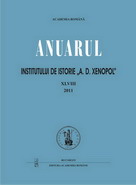ISTORICI ROMÂNI ȘI ISTORII ALE IMPERIULUI OTOMAN. NICOLAE IORGA, GESCHICHTE DES OSMANISCHEN REICHES, NACH DEN QUELLEN DARGESTELLT − SINTEZĂ CENTENARĂ
ROMANIAN HISTORIANS AND HISTORIES OF THE OTTOMAN EMPIRE. NICOLAE IORGA, GESCHICHTE DES OSMANISCHEN REICHES, NACH DEN QUELLEN DARGESTELLT
Author(s): Dan ProdanSubject(s): History
Published by: Editura Academiei Române
Keywords: Nicolae Iorga, romanian turkologist, GOR, ottoman history, centenary synthesis, Romanian edition; fertile ideas
Summary/Abstract: Viewed from the perspective of time, a century after the publication of the last volume (fifth, in 1913) of the monumental Geschichte des osmanischen Reiches, N. Iorga’s work on Ottoman history is extremely precious yet, by its suggestions and ideas. There are five volumes: Ist (from the beginnings of the Turkish tribes to 1451), Gotha, 1908; IInd (from 1451 to 1538) Gotha, 1909; IIIth (from 1538 to 1640) Gotha, 1910; IVth (from 1640 to 1774) Gotha, 1911; Vth (from 1774 to 1912) Gotha, 1913. Nicolae Iorga’s Geschichte des osmanischen Reiches is a work of great value in which the scholar’s encyclopedic knowledge and the erudite’s precision combine with the novelty and boldness of the theses propounded. N. Iorga thus wrote a synthesis of the history of the Ottoman Empire in which the historical events combine happily with the presentation of the economic and social aspects, to the extent in which they could be investigated and known at the beginning of the XXth century. The Romanian historian turkologist considered the history of the Ottoman Empire as an integrant part of world history. The originality of their interpretations opened new vistas for the historical research. The GOR is not only a work of erudition, but a work of interpretation, grounded on profound thinking. The fact that N. Iorga was not able to utilize the Turkish-oriental historical sources in the original, because he hadn’t own Turkish philological and document deciphering training, does not lessen the value of his GOR. After a century, the GOR still offer us bold and fertile ideas. From many reasons, GOR, the centenary synthesis (1913-2013), must be translate in the Romanian language, in critical edition.
Journal: Anuarul Institutului de Istorie »A.D. Xenopol« - Iaşi
- Issue Year: L/2013
- Issue No: 50
- Page Range: 343-354
- Page Count: 7
- Language: Romanian

